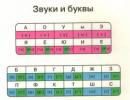French prepositions with translation table. French prepositions (préposition)
Prepositions in French are unchangeable service parts of speech that serve to connect words in a sentence, indicate various relationships between these words (ownership, place, etc.) in a given sentence, and can also simply be a grammatical “tool” and then the prepositions themselves do not have much meaning.
Voilà la maison de mes parents. - This is my parents' house.
L'enfant jouait dans sa chambre. — The child was playing in his room.
Elle était assise en face de moi. “She was sitting opposite me.
Ce livre est difficile à trouver. — This book is difficult to find.
Prepositions in French can consist of one word: à, avec, chez, dans, en, entre, par, parmi, sans, sous, sur, etc. and from several words: à côté de, au lieu de, d’après, grâce à, près de, quant à, etc.
The meaning of some prepositions and their use
de - genitive case, belonging and other meanings:
le livre de Julien - Julien's book
le sens d'un mot - meaning of the word
la lumière de la lune - moonlight
un mur de béton - concrete wall
l'art de vivre - the art of living
trembler de peur - to tremble with fear
jouer de la guitare - play the guitar
un kilo de sucre - a kilogram of sugar
remercier d'un sourire - to thank with a smile
maigrir de 3 kilos - lose 3 kg
Il est difficile d'obtenir un visa pour ce pays. — It is difficult to get a visa to this country.
Nous sommes contents de notre travail. — We are satisfied with our work.
Beaucoup de gens ont un chien. — Many people have a dog.
Il revient de Paris. — He is returning from Paris. Il nous a parlé de sa famille. — He told us about his family.
Il est déjà revenu de son voyage. — He has already returned from his trip.
J'ai reçu une lettre de mon ami. — I received a letter from my friend.
Il descend du wagon. — He gets out of the carriage. Je suis de Minsk. - I am from Minsk.
à - dative case, direction (somewhere) and other meanings:
Je donne ce livre à mon ami. — I am giving this book to my friend.
Il va à l’école. - He is going to school.
Il monte au dernier etage. — He goes up to the top floor.
Ce livre est facile à lire. — This book is easy to read. Il est à Paris. - He's in Paris.
On part à midi (à deux heures). — They leave at noon (at two o’clock).
Nous allons à pied. - We're walking.
Parlez à voix basse! - Speak quietly!
Paul écrit une lettre à ses parents. — Paul writes a letter to his parents.
Vous pouvez prendre ce livre à la bibliothèque. — You can borrow this book from the library.
Il pense à ses parents. — He thinks about his parents.
J'ai un examen à passer. — I need to pass the exam.
Ce livre est à Paul. - This is Paul's book.
une glace à la vanille - vanilla ice cream
un bateau à moteur - motor boat
dans - in (inside), through and other meanings:
vivre dans une belle maison - to live in a beautiful house
dans le tiroir - in the box
Dans ce théâtre il y a cinq cents places. — There are five hundred seats in this theater.
Dans sa jeunesse elle était belle. — In her youth she was beautiful.
Il revient dans trois jours. - He will return in three days.
Ma soeur travaille dans un laboratoire. — My sister works in the laboratory.
en - in, by, on (method and manner of action) and other meanings:
Il voyage en voiture (en bateau). — He travels by car (by boat).
Je lis en français. — I read French.
Cette bague est en or. — This ring is made of gold.
Victor Hugo est né en 1802. - Victor Hugo was born in 1802.
J'ai déjeuné en dix minutes. — I had lunch in ten minutes.
aller en Biélorussie - go to Belarus
vivre en France - live in France
voyager en été (en hiver, en automne) travel in summer (winter, autumn)
But: au printemps - in the spring.
Je ferai ce travail en trois jours. — I will do this work in three days.
monter en wagon - climb into the carriage
par - used with an indirect object of the actor with a verb in the passive form, with a definition to a noun, with various circumstances:
Ce tableau a été peint par Picasso. — This painting was painted by Picasso.
faire les études par correspondance - study by correspondence
sortir par l’escalier - go up the stairs
faire un exercise par écrit - do the exercise in writing
pour - for, for, and other meanings:
J'ai une lettre pour vous. - I have a letter for you.
Merci pour votre invitation. - Thanks for the invitation.
Il est sorti pour acheter un journal. — He went out to buy a newspaper.
Ils partent pour deux jours. — They are leaving for two days.
Le musée est fermé pour travaux. — The museum is closed for work (for work).
être pour quelqu’un - to be for someone
partir pour Paris - to go to Paris
sur - on (surface) and other meanings:
Les livres sont sur la table. - Books on the table.
J'ai collé un timbre sur l'enveloppe. — I put a stamp on the envelope.
Comptez sur moi! - Count on me.
Je voudrais une chambre sur mer. — I would like a room with a sea view.
La fenêtre donne sur la rue. — The window faces the street.
avec - with, used with various circumstances.
Viens avec moi! - Come with me!
écrire avec un stylo - write with a pen
écouter avec attention - listen carefully
chez - at, to (used before nouns denoting persons):
Il va chez son ami. — He goes to his friend.
Elle habite chez sa tante. — She lives with her aunt.
avant and devant - before, before
avant is used before a time adverbial; devant - before the adverbial adverbial place:
Nous sommes venus à la gare avant le départ du train. — We came to the station before the departure (before departure) of the train.
Il y a une pelouse devant la maison. — There is a lawn in front of the house.
entre - between (used to denote space (time, place) that separates persons, objects):
entre les deux maisons - between two houses
entre 10 heures et midi - between 10 o'clock and noon.
parmi - between, among (used to highlight one object (person) from a group of objects (persons):
Y a-t-il un médecin parmi vous? — Is there a doctor among you?
Parmi les spectateurs se trouvait le Président. — The president was among the spectators.
contre - to (close); against:
Mettez la table contre le mur. — Place the table against the wall.
Etes-vous pour ou contre ce candidat? — Are you for or against this candidate?
To indicate where this or that object is located, prepositions will, of course, help you! You are already familiar with some of them from previous lessons; let’s look at them and other prepositions in more detail.
Pretext is a service part of speech and expresses the relationship between nouns (adjectives, verbs) and other parts of speech, in other words, they connect words with each other.
The use of prepositions of place in speech
French prepositions of place are given in the table. Carefully study its contents, paying attention to the translation and example of use. Some prepositions do not coincide with their analogues in Russian. So:
| Pretext | Translation | Example |
|---|---|---|
| dans | V | dans la boîte – in a box dans la rue - on (!) the street |
| sur | on | sur la table - on the table |
| devant | before | devant la maison - in front of the house |
| derrière | behind, behind | derrière l’arbre - behind the tree |
| sous | under | sous la toit - under the roof |
| au-dessus de | above | au-dessus de la boutique – above the store |
| au milieu | in the middle | au milieu du lac - in the middle of the lake |
| au-dessous de | under (without touching) | au-dessous de zéro - below zero |
| entre | between | entre les rangs - between the rows |
| parmi | among | parmi nous - among us |
| à gauche | left | à gauche du magasin – to the left of the store |
| à droite | on right | à droite de la porte – to the right of the door |
| pres de | near | pres de Paris - near Paris |
| loin de | far from | loin de la maison - far from home |
| le long de | along | de long de la route - along the road |
| autour de | around | autour de la blessure - around the wound |
| â côté de | Near | à côté de l’accoudoir – next to the armrest |
| en face | against | en face du musée – opposite the museum |
| en haut (de) | to the top | en haut de ma liste – at the top of the list |
| en bas (de) | at the bottom) | en bas de la bâtiment - at the bottom of the building |
| contre | near | contre le mur – against the wall |
| par | through, through | par la forêt – through the forest |
Don't forget that the article has a masculine gender and a preposition de a merger occurs.
Prepositions of place can also include prepositions of direction. For example, the preposition “à”: à l’école- to school, or pretext "vers": vers le Nord- on North.
Remember that the table shows only frequent examples of the use of French prepositions. More complete information can be obtained by reading original texts, books, even songs. For now, start small - do exercises based on the material in the table.
Lesson assignments
Exercise 1. Translate into French.
1. next to the girl 2. up the street 3. at the bottom of the stairs 4. around the library 5. along the river 6. away from the city 7. next to you 8. to the left of the plate 9. to the right of the window 10. to the left of the stove 11. between states 12. south 13. in the room 14. on the wall 15. underground
Answer 1.
1. à côté de l'a fille 2. en haut de la rue 3. en bas de l'escalier 4. autour de la bibliothèque 5. le long de la rivière 6. loin de la ville 7. près de vous 8. à gauche de l'assiette 9. à droite la fenêtre 10. à gauche du four 11. entre États 12. vers l'est 13. dans la chambre 14. sur la mur 15. sous la terre
You will spend 30 minutes on this lesson. To listen to the word, please click on the Audio icon . If you have any questions regarding this course, please contact me by email: Learn French.
Below is a list of the most commonly used words, the scope of which is: Prepositions. The table below has 3 columns (Russian, French and pronunciation). Try to repeat the words after listening. This will help you improve your pronunciation and also remember the word better.
List of adjectives
| Russian language | Prepositions | Audio |
|---|---|---|
| before | en face | |
| behind | derrière | |
| before | avant | |
| after | après | |
| inside | à l "interior | |
| With | avec | |
| without | sans | |
| outside | à l "exterior | |
| above | sur | |
| under | sous | |
| O | sur | |
| against | contre | |
| And | et | |
| How | comme | |
| between | entre | |
| But | mais | |
| For | pour | |
| from | a partir de | |
| V | dans | |
| instead of | au lieu de | |
| near | pres de | |
| genitive preposition | de | |
| or | Ou | |
| since (for some time) | depuis | |
| So | Donc | |
| To | à | |
| before | jusqu"à ce que |
Here is a list of sentences containing several vocabulary items shown in the above topic about: Prepositions. Sentences are added to help you understand how the structure of an entire sentence can affect the function and meaning of individual words.
Prepositions with examples
This is a list of vocabulary directions. If you learn the following words by heart, it will make your conversations with the natives much easier and more enjoyable.
Vocabulary Directions
| Russian language | Direction Indications | Audio |
|---|---|---|
| Can you help me? | Pouvez-vous m"aider? | |
| Could you show me? | Pouvez-vous m"indiquer? | |
| Come with me! | Venez avec moi! | |
| City center | Le center-ville | |
| Sorry... | Excusez-moi! | |
| Go straight | Allez tout droit | |
| How do I get to the museum? | Pour aller au musée? | |
| How long does it take to get there? | Ça prend combien de temps pour y aller? | |
| I'm lost | Je suis perdu(e) | |
| I'm not from here | Je ne suis pas d"ici | |
| It is far from here | Il est loin d"ici | |
| It's nearby | Il est près d'ici | |
| Wait a minute! | Un moment, s"il vous plaît! | |
| Turn left | Tournez à gauche | |
| Turn right | Tournez a droite | |
| Far | Loin | |
| Here | ici | |
| Left, left, left, left, left | à gauche | |
| Right, right, right, right, right | à droite | |
| Near | Près | |
| Straight, straight, straight, straight, straight | Tout droit | |
| there | là | |
| Drive a car, drive | conduire / aller en voiture | |
| To turn | Tourner | |
| Walk | marcher | |
| traffic light | Les feux | |
| Directions | Le transport |
Daily Talk
French phrases
| Russian language | French | Audio |
|---|---|---|
| Do you speak English? | Parlez-vous anglais? | |
| A little | Oui, un peu | |
| What is your name? | Vous vous appelez comment? | |
| My name is (John Doe) | Je m'appelle (Jacques Bonhomme) | |
| sir, madam, girl | Monsieur... / Madame... / Mademoiselle... | |
| Nice to meet you | Enchanté(e)! | |
| You are very kind! | Vous êtes très gentil! |
Benefits of learning a language
Learning a second language can reduce the severity of symptoms such as Alzheimer's disease, forgetfulness, and brain atrophy because learning a new language helps create new brain cells.
In French, a preposition is an auxiliary part of speech that does not change; it serves to connect words in a sentence and indicates different relationships between these words (place, belonging, etc.) in a given sentence. Prepositions may also have no separate meaning and serve as a simple “tool” of grammar. In this article we will analyze the meanings of the prepositions “à” and “de” in French, as well as several other most commonly used ones in speech.
Preposition "a"
In French, the preposition "à" remains one of the most frequently used. What are the cases of its use?
1. Can be a preposition of place and also mean:
Distance from any place:
Le port se trouve à 2 kilometres de la ville. - The port is located 2 kilometers from the city.
La salle de sport se trouve à 30 mètres de chez moi. - The gym is located 30 meters from my house.
Someone's location:
Il est à Moscow. - He (is) in Moscow.
Il a trouvé les cours de l'italien à Moscou. - He found Italian courses in Moscow.
Direction of travel: Il va à Moscow. - He's going to Moscow. Nous allons à Marseille. - We're going to Marseille.
Also, the French preposition "à" is used in the following expressions: à droite - to the right; à gauche - to the left.
2. Can express a way of acting: S "il vous plaît, parlez à basse voix. - Please speak quietly!
3. Is a preposition of time: On t’attend à minuit. - We are waiting for you at midnight.
4. Can express a method of action: We play together. - Nous jouons à deux.
5. Serves to indicate value or measure: A quel prix tu as acheté cette robe. - At what price did you buy this dress?
6. It can be placed before an indirect object:
Which is expressed by the infinitive:
Il commence à regarder la tele. - He starts watching TV.
Elle s"est mise à pleurer. - She began to cry.
Which is expressed as a noun and answers the question “for what?” (expresses the purpose of the item):
Une cuillère à dessert. - Dessert spoon.
Une tasse à thé. - Cup for tea.
Which is expressed by a noun and denotes belonging:
Ce journal est à mon frère. - This newspaper belongs to my brother.
Cet ordinateur est à mon père. - This computer belongs to my dad.
Which is expressed by a noun and answers the question what? to whom? J'écris une lettre à ma mère. - I'm writing a letter to my mother. Je m"intéresse à l"histoire. - I'm interested in history.
7. In French, the preposition "à" is also used in fixed expressions (in spoken French):
A tes souhaits - be healthy! (if the interlocutor sneezes).
A la vôtre (à la tienne)! - For you! To your health! (when clinking glasses).
A table! - To the table!
A l'aide! - Help!
The French preposition "à", merging with the definite articles "les" and "le", forms the fused forms "aux" and "au":
Au secours! - For help!
Je suis allé au cinéma cet après-midi. - This afternoon I went to the cinema.
Le professeur a parlé aux élèves. - The teacher spoke to the students.
The French preposition "à" in Russian corresponds to the prepositions: s, na, v.
Preposition "de"
The preposition "de" is also very functional in French. It can also express various connections in a sentence.
1. The preposition "de" serves to designate a place (serves to designate the starting point of movement): Vous êtes de Moscow? - Are You from Moscow?
2. Plays the role of a preposition of time: du matin au soir - from morning to night, de notre temps - in our time.
3. Preposition of manner of action: Elle a parlé d’un ton méchant. - She spoke in an angry voice.
4. The preposition "de" in French is also a preposition of manner of action: Il joue du piano. - He plays the piano.
5. Expresses measure (size): Tu es moins grand que lui de 13 centimètres. - You are 13 centimeters shorter than him.
6. Serves to express the reason: Il a tremblé de froid. - He was shivering from the cold.
7. The preposition “de” in French is placed before the direct object: Je lui propose de manger chez moi. - I invite him to eat with me.
8. The preposition “de” is also used before an indirect object:
If it is expressed by the infinitive: Il n "a pas peur d'y aller. - He is not afraid to go there.
If it is expressed by a noun or pronoun: Cela ne dépend pas de vous. - It doesn't depend on you.
9. The French preposition "de" in a sentence can indicate ownership:
- la fourchette du père - father's fork;
- la table du professeur - the teacher's table.
10. May indicate the material from which the item is made:
- marble steps - marches de marbre.
11. Gives an indication of the purpose of the item:
- chaussures de sport - shoes for sports;
- la salle de sport - gym.
12. May indicate the object to which the action is directed:
- storming of the Bastille - prize de la Bastille.
13. May indicate origin:
- le train de Moscow - train from Moscow;
- l "avion de Nantes - plane from Nantes.
14. May indicate the instrument of action:
- hit with your hand - frapper de la main.
15. The French preposition "de" is used in some stable phrases: wire - fil de fer, town hall - hôtel de ville.

Preposition "en"
The analogue in Russian will be the prepositions “in”, “by”, “on” (image and method of action), as well as other meanings:
Il a voyage en voiture (en bateau). — He traveled by car (by boat).
J"écris en russe. - I read in Russian.
Ce braclet est en argent. — This bracelet is made of silver.
Alexandre Pouchkine est né en 1799. - Alexander Pushkin was born in 1799.
J'ai dîne en quarante minutes. — I had dinner in forty minutes.
Vivre en Biélorussie. — Live in Belarus.
Aller en Italie. - Go to Italy.
Voyager en hiver (en automne, en été). - Travel in winter (autumn, summer).
The exception is "in the spring": au printemps.
Je vais faire ce travail en quatre jours. — I will do this work in four days.

Preposition "pour"
The French preposition "pour" is translated into Russian as "to", "for", "for", there are also other meanings:
Elle est sortie pour acheter un livre. — She went out to buy a book.
J'ai une bonne nouvelle pour vous. - I have good news for you.
Il part pour trois jours. — He's leaving for three days.
Merci pour ton accueil. - Thank you for the welcome.
Le magasin est fermé pour travaux. — The store is closed for renovations.
Partir pour Venise. - Leave for Venice.
Tu me prends pour un fou? -Are you taking me for a fool?
Preposition "dans"
Most often, this preposition is the French analogue of “through” and “in” (meaning “inside”), and also has other meanings:
Dans la boîte. - In the box.
Dans ce cinéma il y a une centaine de places. — There are a hundred seats in this cinema.
Dans son enfance j"étais très mignon. - As a child, I was very cute.
Vivre dans une maison confortable. - Live in a comfortable house.
Il part dans quatre jours. — He's leaving in four days.
Mon amie travaille dans une librairie. — My friend works in the library.
Preposition "sur"
This preposition has a meaning on the surface of something:
Les journaux sont sur le lit. — Newspapers on the bed.
Je colle des timbres sur mon enveloppe. — I put stamps on the envelope.
Compte sur eux! - Count on them.
Cette fêtre donne sur la piscine. — This window overlooks the pool.
Prepositions "devant" and "avant"
How do they differ, since both are translated as “before, before”? "Devant" is used before an adverb of place, and "avant" is used before an adverbial of time:
Ils sont venus au port avant le départ du bateau. — They came to the port before the departure (before departure) of the boat.
Il y a une piscine devant l"école. - There is a swimming pool in front of the school.
Preposition "entre"
From French “entre” is translated as “between” (it is used to designate space (place, time) separating objects, persons):
Entre 9 heures et minuit. — Between nine o'clock and midnight.
Entre les deux bâtiments. - Between two buildings.
Other prepositions
The preposition "chez" has the meaning "to, at" (it is used before nouns that denote persons):
Nous habitons chez notre oncle. - We live with our uncle.
Nous allons chez notre tante. - We are going to our aunt.
There is a preposition “contre” - against, to (meaning “close”):
Es-tu pour ou contre ce projet? — Are you for or against this project?
Nous mettons le canapé contre le mur. — We put a small sofa against the wall.
The preposition "avec" means "with" and is used in different circumstances.
Manger avec une fourchette. - Eat with a fork.
Venez avec ce monsieur! - Go with this gentleman!
The preposition “parmi” means “among”, “between” (it is used to distinguish one person (object) from a group of persons (objects):
Parmi les candidats se trouvait le Premier Minister. — Among the candidates was the Prime Minister.
Y a-t-il un ingénieur parmi vous? — Is there an engineer among you?
The preposition "après" corresponds to the Russian prepositions "after", "through", "for". It is sometimes confused with the adverb "après" (then, after, then).
1. It can indicate location (behind something): Après le corridor, la salle de bain. — Behind the corridor is the bathroom.
2. Can mean “after some period of time”: Nous sommes revenus à Moscou quatre jours après. - We returned to Moscow four days later.
3. Can be part of set expressions: soupirer après - yearn for..., sigh for...; après tout - ultimately, ultimately.






